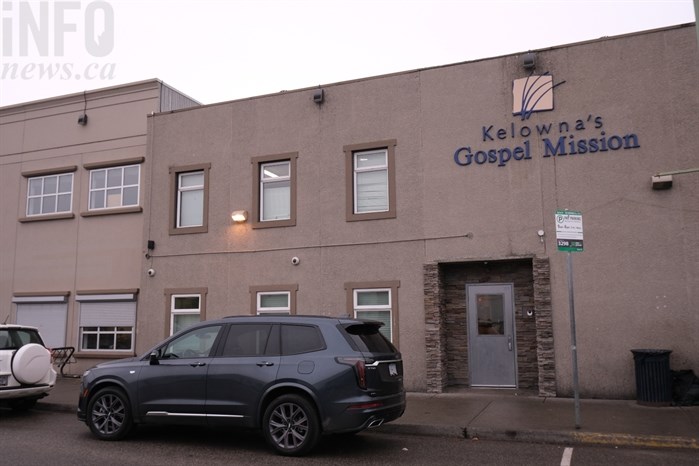
Kelowna's Gospel Mission homeless shelter.
(CARLI BERRY / iNFOnews.ca)
December 17, 2022 - 1:00 PM
Interior Health is already at the table and doing everything it needs to support homeless shelters in Kamloops and the Okanagan, says the executive director of clinical operations for the Thompson-Cariboo region.
Lisa Zetes-Zanatta spoke to iNFOnews.ca after accusations were made by shelter operators that people with serious health issues were being dumped on them and there is no funding from the health authority to hire their own health care workers.
“It’s not about funding,” Zetes-Zanatta said. “It’s about really understanding where each provider is responsible for provision of care. Interior Health focuses absolutely on health-related needs of individuals and we ensure that, if there are health related needs that need to be met, regardless of where people’s residence is, then we actually provide those.”
Health care workers go into the two permanent shelters in Kamloops two mornings a week to provide things like changing dressings on wounds or directing residents to mental health or addiction services, she said.
Similar services are provided in Kelowna and other communities, she said.
While that may be the case, it’s certainly not enough, according to a November open letter to Interior Health and local governments signed by six shelter operators in the region.
“Interior Health is responsible for the health of citizens regardless of their housing status,” the letter said. “Interior Health has passed much of that responsibility to shelter, outreach, and supportive housing operators. The Health Authority, by their absence, has left it to us to handle medication administration, co-morbidities, bathing and hygiene, overdose reversals in an unrelenting drug poisoning crisis and unmedicated people with severe mental illness where poly substance use is the norm.”
READ MORE: Homeless shelter operators in Okanagan, Kamloops tired of gov't downloading, inaction
Zetes-Zanatta’s response was that workers are not seeing those kinds of needs in shelters.
“When our health professionals are at the shelters, what we're seeing more often as not, is a need for connection with services, to mental health and substance use services as well as wound care,” she said. “And the public health component, that’s the other piece we’re really looking at to ensure people are updated on vaccines, that we’re giving them harm reduction supplies if that’s what’s required. But we’re not seeing the inability to eat, to cook for themselves, to mobilize. Those are the things we have home support workers for.”
If someone in a shelter needs more home support help, all they have to do is talk to the Interior Health workers on the days they go into the shelters, Zetes-Zanatta said. They will be assessed and, if appropriate, additional help will be provided just like it would be for a senior living in a house.
Patricia Bacon, executive director of the John Howard Society that operates the Cornerstone shelter in downtown Kelowna, told iNFOnews.ca last week that some of the issues shelters are dealing with are people in wheelchairs or with other mobility issue who need help, for example, getting in and out of bed.
READ MORE: Shelter operators sick of Interior Health not doing its share
“Being wheelchair bound, they are trained to transfer between their wheelchair and their bed and the washroom, so that may not be, perhaps, the example we would use,” Zetes-Zanatta said.
If a need is demonstrated, Interior Health will provide the home support services for shelter residents, she said.
The twice-weekly visits are being evaluated on an ongoing basis to see if they’re matching the need.
“We sit down with our local operators,” Zetes-Zanatta said. “In Kamloops, because of the sheer volume of people that we have in our shelter environment, we’re meeting on a weekly basis and, sometimes, twice weekly.”
These “ongoing connection points” have been happening throughout the almost four years she’s been working for Interior Health, she said.
In terms of funding support so shelters can hire their own health care staff, that’s not up to Interior Health, Zetes-Zanatta said.
Shelter agencies would have to apply to the organizations that fund them if they want to add such services to their budgets.
Despite what Zetes-Zanatta says about the level of service being provided, the shelter operators are not satisfied.
“It is early days in our efforts to develop a framework between Interior Health Authority resources and shelter and supportive housing operators in the region,” Bob Hughes, CEO of ASK Wellness Society, one of the signatories of the open letter, said in an email to iNFOnews.ca.
“We are hopeful that we can create standardized, accessible health services for shelter and supportive housing users, either provided by Interior Health Authority or directly by the operators themselves. The provision of these services in a consistent and appropriate manner is critical to the success of our operations and we hope to share positive outcomes from our recent efforts to bring Interior Health to the table in the near future.”
To contact a reporter for this story, email Rob Munro or call 250-808-0143 or email the editor. You can also submit photos, videos or news tips to the newsroom and be entered to win a monthly prize draw.
We welcome your comments and opinions on our stories but play nice. We won't censor or delete comments unless they contain off-topic statements or links, unnecessary vulgarity, false facts, spam or obviously fake profiles. If you have any concerns about what you see in comments, email the editor in the link above.
News from © iNFOnews, 2022